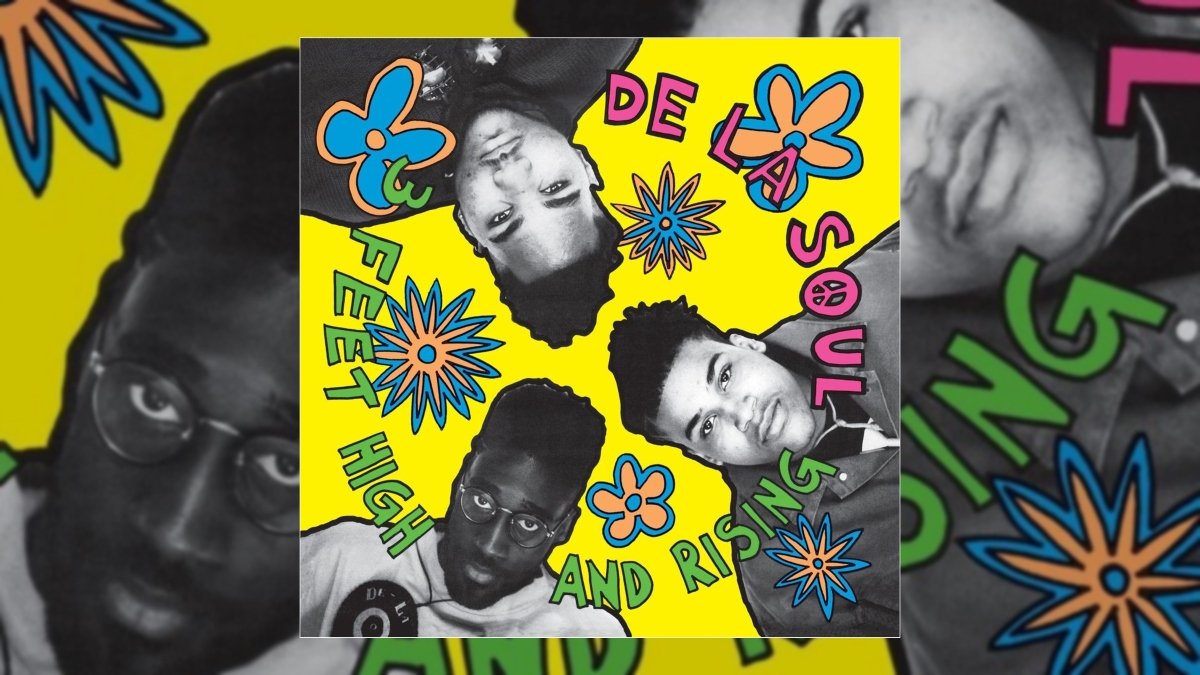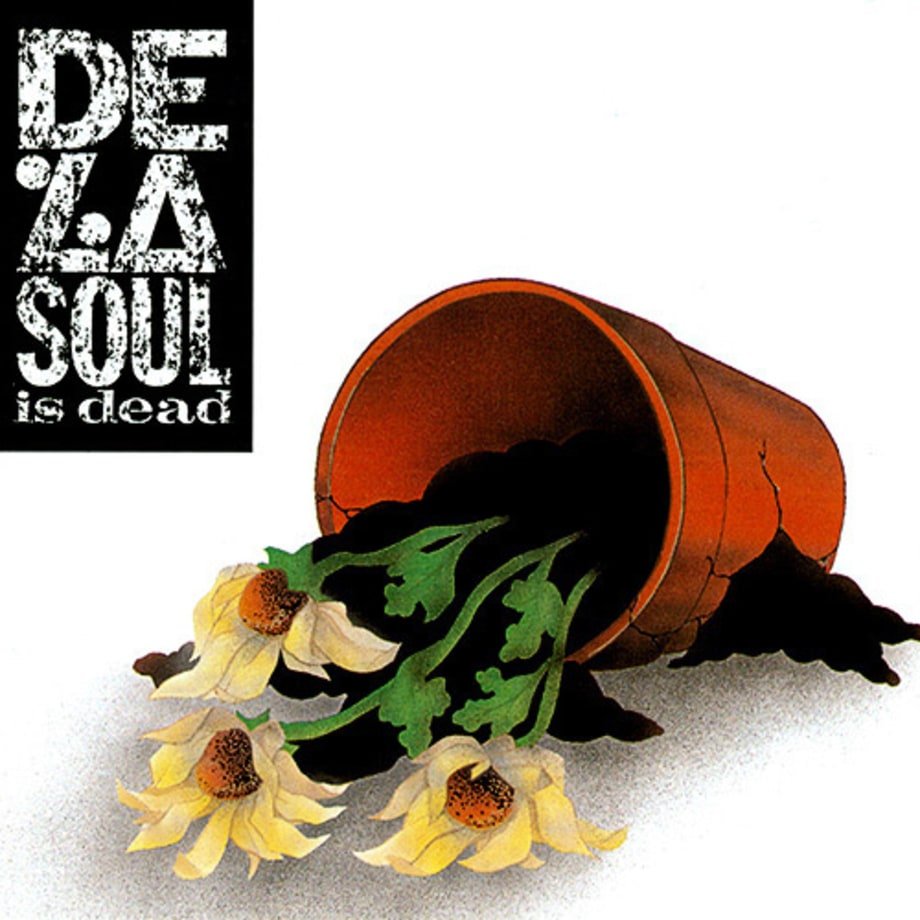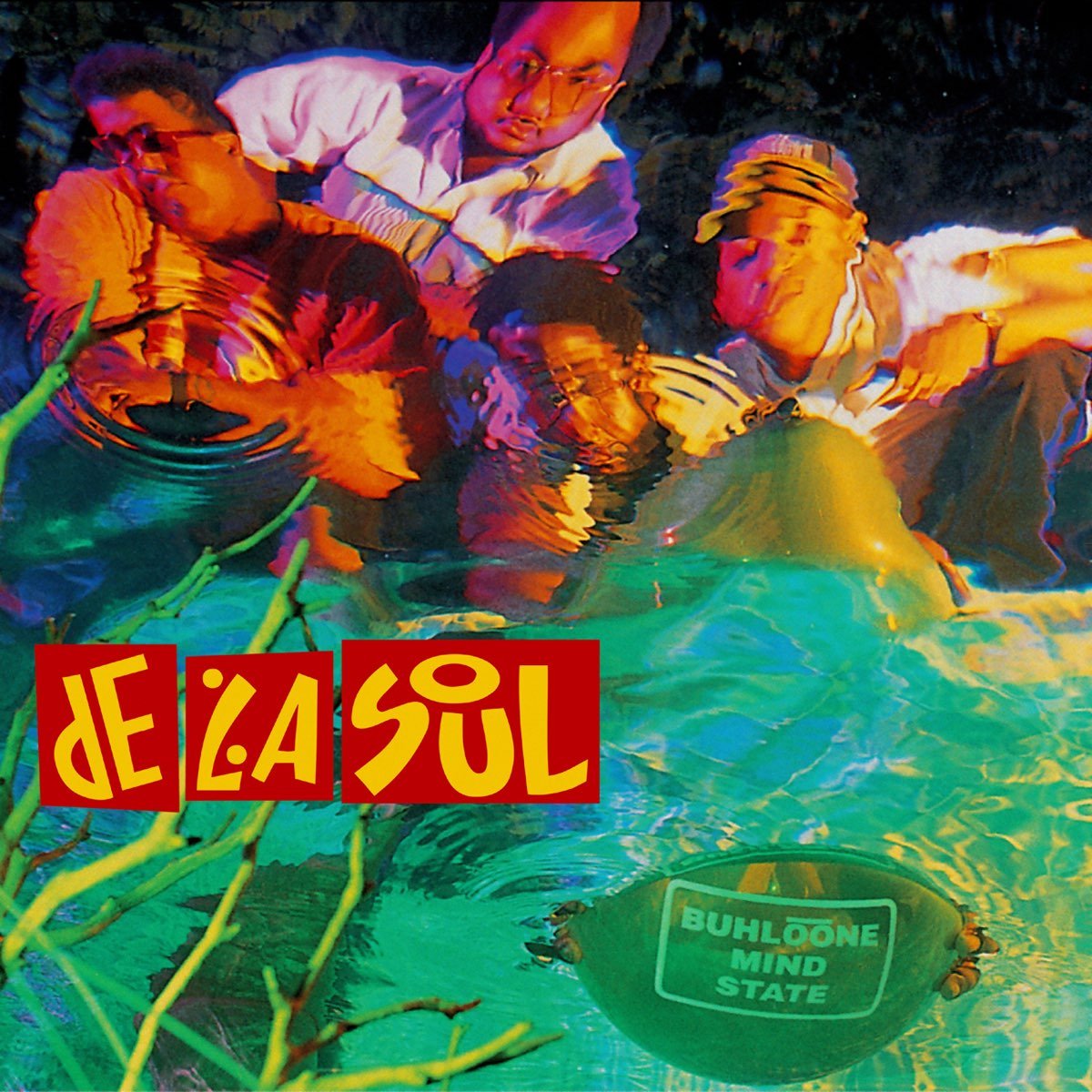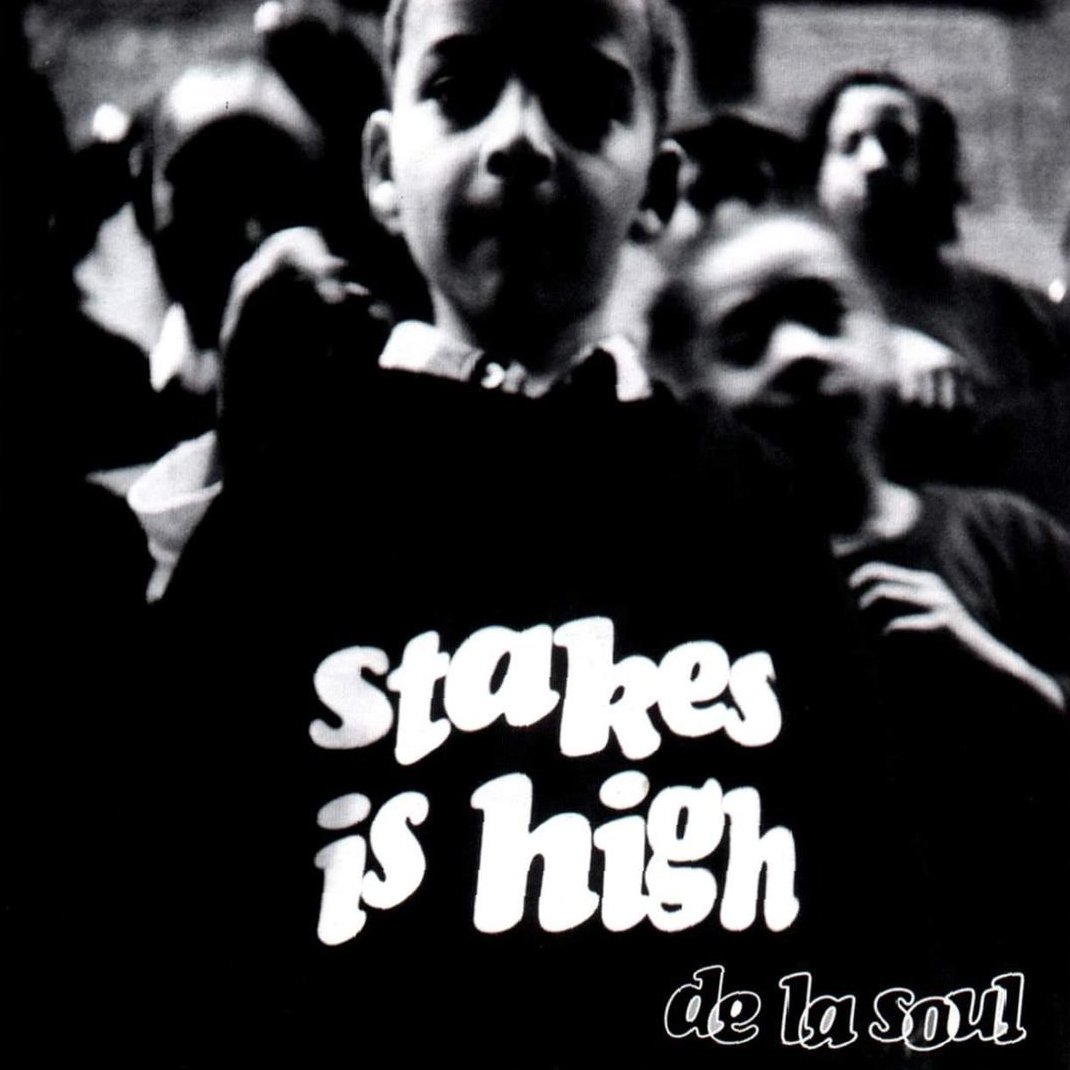Happy 35th Anniversary to De La Soul’s debut album 3 Feet High and Rising, originally released March 3, 1989.
De La Soul explain themselves on “Brainwashed Follower.” “Weird guys” Kelvin “Posdnuos” Mercer, Dave “Trugoy the Dove” Jolicoeur, and Vincent “P.A. Mase” Mason are confronted by Jeff, a grade-schooler who doubts their authenticity as rappers.
“Where are your dukey gold chains?” Jeff—voiced by Native Tongues comrade Chi-Ali—inquires. “Y'all are crazy. No chains, dag. Okay, where's your BMW? You're not supposed to walk. Where's your jeeps, your Maximas?...Don't you know you can't be def if you don't have no gold? Or a car, man? What’s up?... Where's your beepers? Why don't you have beepers? Everybody wears beepers. You have to have beepers to look down.”
The trio patiently tell the kid that superficial symbols of status aren’t important if you enjoy the music. “It’s just that we don't deal with all that materialistic stuff, but we still got what it takes to please and supply our listeners, understand my man?” Pos declares.
This skit doesn’t actually appear on the original pressing of 3 Feet High and Rising. It’s technically a “C-side” to “Me Myself and I,” their most successful single. The song could only be played if you found the hidden groove while spinning the record’s B-side. This is fitting, because the idea that De La Soul would put something so straightforward on their debut album is borderline unfathomable.
Released 35 years ago, 3 Feet High and Rising was unlike anything that had been released before it. It was a strange and sprawling piece of work that was the product of four young men making the bold and brave statement that it was okay to be different in hip-hop.
It’s hard to oversell how 3 Feet High and Rising was borderline alien compared to anything that had been released before it. There had been other crews that were left of center, like Ultramagnetic MCs and the Jungle Brothers, (more on them in a sec), but De La Soul were positively indecipherable. Pos, Dove, and Mase, along with producer “Prince” Paul Huston came together to craft the definitive oddball hip-hop album that created the lane for others who wanted to go against the grain. And while making the album, Prince Paul encouraged De La to experiment as much possible, try new things, and not be afraid to make mistakes. It’s this wide-eyed and liberated attitude that give 3 Feet High and Rising a lot of its charm.
It made sense that they came together with the aforementioned Jungle Brothers and the fledgling group A Tribe Called Quest to form the groundbreaking Native Tongues clique. The crew became synonymous with outside-of-the-box thinking in regards to hip-hop music, and 3 Feet High and Rising is the foundation for their movement.
When I first heard 3 Feet High and Rising, I didn’t quite get “it.” I was 13, and the album was a bit too odd for me at the time. The group used obscure slang and their lyrics and skits seemed to be filled with in-jokes that were inscrutable except to those in their immediate crew. A classmate had to explain to me that “Potholes In My Lawn” was about people stealing their rhymes; I would have had no idea otherwise. Still, I’d dug the singles, especially the “Buddy” remix, which I’d gotten to know through its low-budget but madcap video. What a difference a couple of years made, as I revisited 3 Feet High right around the time that its successor De La Soul Is Dead (1991) surfaced, now more open to its idiosyncrasies and bizarre moments.
Watch the Official Videos:
These days, the younger hip-hop heads do not hesitate to embrace groups like De La. Of the albums released during hip-hop’s late 1980s era, 3 Feet High and Rising is one of the most beloved among Generation Z. Part of it likely has to do with the novelty of its former scarceness: almost all of De La’s discography was unavailable on streaming services until about a year ago.
But its quirkiness also appeals to a growing young segment of the population that isn’t afraid to challenge traditional norms. When a re-recorded a version of “Magic Number,” 3 Feet High’s opening track, was played during the closing credits of the mega-hit Spider-Man – No Way Home (2021), which earned close to $2 billion in the worldwide box office, it demonstrated just how adored the crew had become among music fans of all stripes.
Much of the attention of 3 Feet High centers on its production, handled by Prince Paul. Specifically, it centers on the sample sources for the album. A lot of hip-hop artists mainly subsisted on samples from James Brown and Ultimate Beats and Breaks Records. De La Soul and Prince Paul were one of the first groups to utilize records from eclectic sources as the bricks and the mortar for their tracks. They sampled songs from relatively obscure artists like the Mad Lads and Cymande, and untouched musical ground like Steely Dan and Liberace. The album’s title is taken from a line in an early Johnny Cash song. This brand of creativity is one of the reasons it took so long for 3 Feet High to be available on streaming services.
As mentioned earlier, the album’s subject matter can be hard to decipher, but the group spends the album positioning themselves as rejecting the traditional definition of what it means to be a rapper. “Me Myself and I” remains the group’s anthem in that sense, expressing the importance of substance above traditional style, and how if the music dope, their dress doesn’t really matter. The point was hammered home in the video for the song, which was about rejecting the ultra-machismo driven image of what many associated with being a rapper.
For all the attention that 3 Feet High receives for the group’s abstract approach and their beats, Pos and Dove don’t get enough credit as innovative emcees. The two really experiment stylistically, crafting non-traditional rhyme schemes and patterns, switching deliveries and flows mid-song. They display this aptitude right from the get-go with their first single “Plug Tunin’,” and continue on songs like “Magic Number,” “Change in Speak,” “Living in a Full Time Era,” and “D.A.I.S.Y. Age.”
De La were among the best at the time in creating songs that concerned their love of the opposite sex, albeit in a reasonably inventive manner. “Jenifa Taught Me (Derwin’s Revenge)” is a rollicking dedication to high school love. It’s a unique composition complete with a plucky drum pattern, horn and vocal samples from Maggie Thrett’s “Soupy,” and an interlude featuring “Chopsticks” as played by Liberace. It’s filled with tongue-and-cheek innuendo, while still remaining goofy fun.
“Eye Know” has the honor of being one of the best hip-hop love songs ever recorded, right up there with Tribe’s “Bonita Applebum” and “Electric Relaxation.” It’s an extremely sweet composition, complete with allusions to “bouquets of soul” and “De La Heaven.” Prince Paul put together one of the album’s most evocative tracks, mixing Steely Dan’s “Peg” with the horns from the Mad Lads’ “Make This Lady Mine” and the outro whistle from Otis Redding’s “(Sittin’ On) The Dock of the Bay.”
“Buddy” is one of the earliest posse cuts, showcasing the first time the original members of Native Tongues rhymed together on a song. An ode to their love of the female body (a.k.a. “Buddy”), De La are joined by Afrika, Mike G, and Q-Tip, as they lay down their laid-back flows over a sample of Bo Diddley’s “Hit Or Miss.” The song’s “Native Tongue Decision” remix is another of their most beloved recordings, featuring an all-new beat that samples Taana Gardner’s “Heartbeat” and appearances from Monie Love and Queen Latifah, as well as Phife Dawg’s first recorded verse.
Occasionally De La delve into more serious territory. “Say No Go” is one of the best anti-crack anthems ever recorded, with the group imaginatively repurposing vocals from Hall and Oates’ “I Can’t Go For That (No Can Do)” into a funky but haunting warning about the ravages of drug use. There are few rhymes about the dangers of crack cocaine as evocative as Pos’ description of “A baby is brought into a world of pits / And if it could've talked that soon in the delivery room/ It would've asked the nurse for a hit.”
Enjoying this article? Click/tap on the album covers to explore more about De La Soul:
“Ghetto Thang” is a grim and unflinching look at poverty that grips the economically disadvantaged communities across the United States. The beat is murky, sounding like it’s a transmission from the deepest, darkest recesses of despair. Dove tries to explain the self-perpetuating cycle of hopelessness that residents in these communities face, rhyming, “Though confident they keep it kept, we know for fact / They lie like ghettos form, cause people lack / To see that they must all get out the ghetto hold / The truth they never told.”
Any discussion of 3 Feet High should mention the skits, which are prominent throughout the album. Skits are now largely considered a nuisance: skippable moments that interrupt the flow of the album. De La Soul and Prince Paul were pioneers, one of the few crews to use them properly, conveying their unique sensibilities and adding to the album’s overall theme.
De La Soul came up with some on the fly. Prince Paul apparently devised the game show-based skits that recur throughout the album during the album’s mastering period. Others, like “Can U Keep a Secret?”, featuring Prince Paul whispering phrases like, “Trugoy has dandruff” and “Dante is a scrub,” are as bizarre yet intriguing as anything on the album. “Take It Off,” De La’s parody/re-working of Krown Rulers’ “Kick The Ball,” targets consumerism and the use of fashion as status in hip-hop. The spoken word “Description” serves as a perfect transition to “Me Myself and I.”
“Transmitting Live From Mars,” while wildly entertaining, is notable for the legal trouble it caused the group and Tommy Boy Records. The skit seems innocuous enough, with Prince Paul playing segments from a French language tutorial record over a sample of The Turtles’ “You Showed Me.” The problem arose when Tommy Boy failed to clear the sample with The Turtles, who then in turn sued the bejesus out of the label and the group. After asking for $2.5 million, The Turtles reportedly settled out of court for $1.7 million. It was one of the first prominent sample lawsuits, setting the stage for the eventual game-changing Gilbert O’Sullivan vs. Biz Markie case.
And there are a few mistakes. Even Prince Paul admits that “De La Orgee” is an embarrassingly bad misstep. It’s a minute and 15 seconds of interminable moaning by the entire Native Tongue crew and some female friends over a loop of Barry White’s “I'm Gonna Love You Just a Little More Baby.”
De La came out of their experience with recording 3 Feet High far less easy going and much more disillusioned. As a result, they followed it up with De La Soul Is Dead, their explicit rejection of their “D.A.I.S.Y.”-centered image. It led to a lot of great music, but their debut still seems to resonate the most across the broadest audience.
These days, De La have re-embraced the legacy of 3 Feet High and Rising. Much of the reason does have to do with their catalogue finally being available on streaming services, allowing both their older fans to rekindle their love of their music and new fans to learn about their greatness.
It was a long and arduous process to get to this point, with De La first publicly struggling with Tommy Boy Records to gain some control over their material. The turning point began when the New York-based music rights company Reservoir bought the rights to the Tommy Boy catalogue in 2021. With the help of Faith Newman, longtime hip-hop industry O.G., the company worked out a deal with De La in order to get their music back into the digital world.
Then, in the words of Pos, came the “very lengthy, draining process” of clearing the samples for the albums, which was especially difficult with 3 Feet High. The process took about two years and was helped by Deborah Mannis-Gardner, president of DMG, an organization that specializes in sample clearances. Not everything could be worked out, and certain components of the songs were either re-created (reportedly with Prince Paul’s help) or left off entirely.
The release of these albums on streaming went hand in hand with the re-issuing of all of their Tommy Boy catalogue in multiple physical formats, from vinyl to CDs to tapes. De La already released limited pressings of such 45 RPMs of songs on 3 Feet High, including “Magic Number” and “Eye Know.”
Sadly, the group’s triumph came with tragedy. Just weeks before the group’s “relaunch,” Dave passed away. The cause of death has never been officially disclosed, but the emcee was open about his battle with congestive heart failure.
De La has solidered on, promoting their discography and touring extensively. Talib Kweli frequently joins the group on stage, reciting Dave’s genius verses. Their sets often prominently feature material from 3 Feet High.
Over three decades later, De La Soul are one of the most respected and revered crews around, with an unflinchingly loyal fanbase. 3 Feet High and Rising still holds up as a towering artistic achievement for the group and hip-hop in general. It’s an extremely influential album and it’s hard to imagine the evolution of abstract or even underground hip-hop without its existence.
Listen:
Editor's note: this anniversary tribute was originally published in 2019 and has since been edited for accuracy and timeliness.





